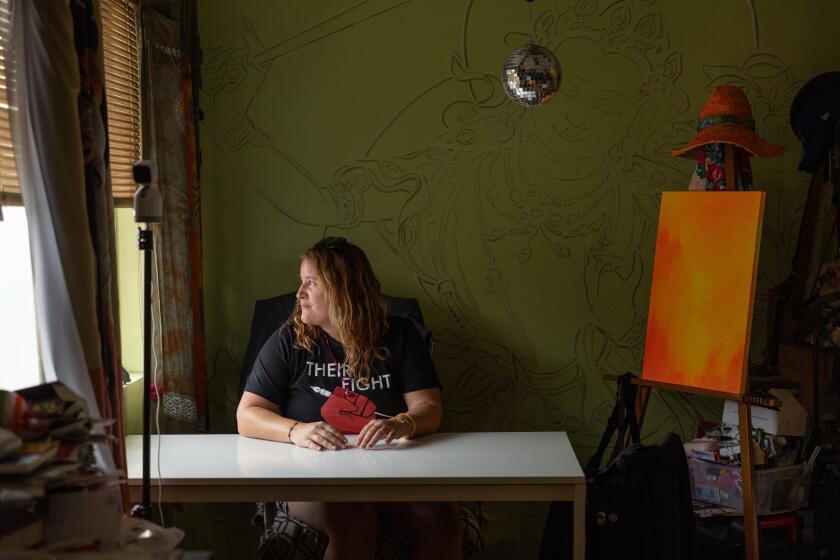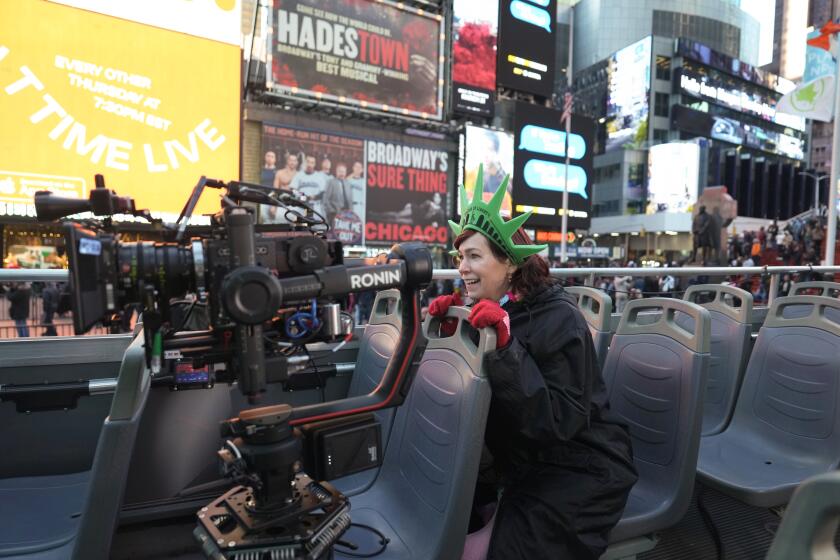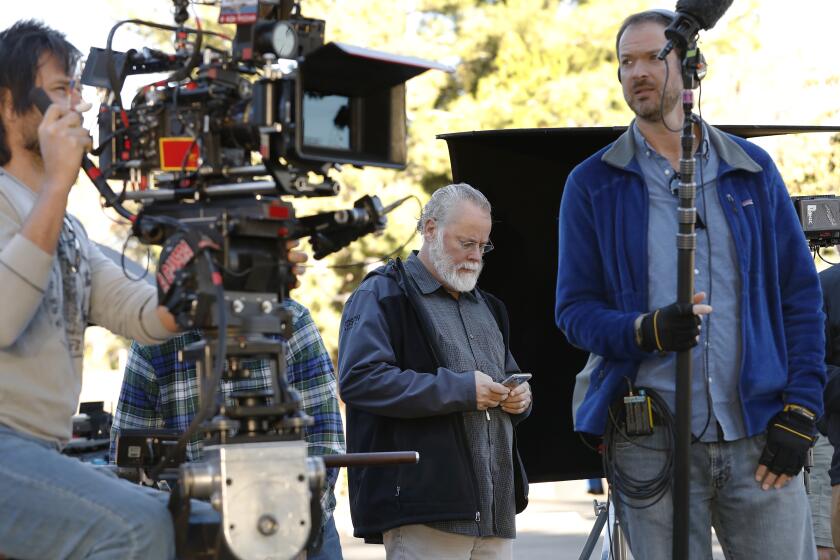Hollywood crews in ‘crisis’: ‘Everyone’s just in panic mode’ as jobs decline
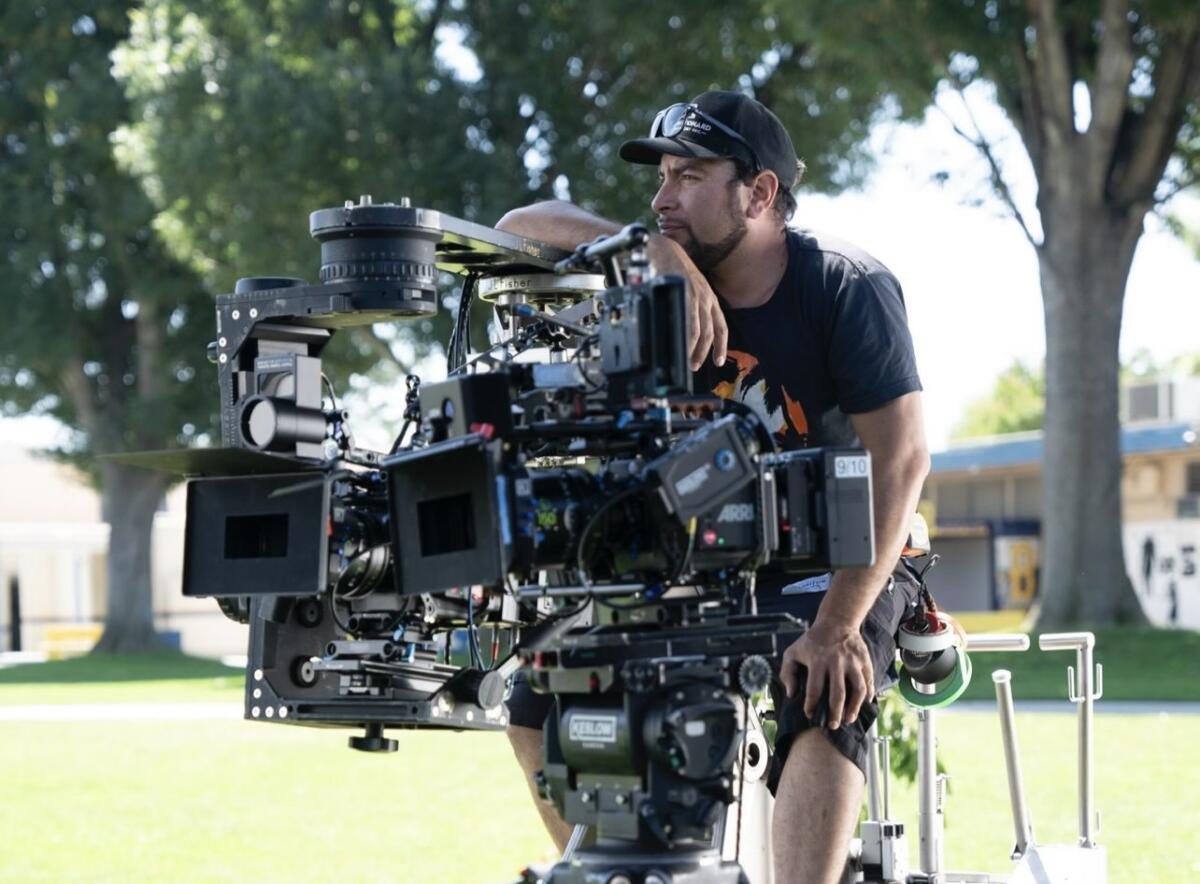
- Share via
After more than two decades in the industry, Keith Dunkerley still loves nothing more than working on a set. The 47-year-old director of photography and camera operator, who’s had consistent work since he moved to Los Angeles 23 years ago, said his is “the best job in the world.”
Since the writers’ and actors’ strikes last year and the slow restart of production, though, Dunkerley said his work opportunities look quite different than in past years: He has worked only 18 days during the first five months of 2024.
“People outside the business don’t understand this is not a factory,” Dunkerley said. “It’s not like, ‘OK, the strike’s over, go back to the factory, turn the lights on and get the machines going.’ A lot of us knew it’s going to take some time to ramp things up.”
Crew members are expressing frustration at the length of the writers’ and actors’ strikes as Hollywood workers struggle to pay for rent, food and healthcare.
While Dunkerley supported his family through savings and odd jobs as a handyman on TaskRabbit during the strikes, the sluggish rebound has been difficult for him. He’s recently made more than 60 calls to friends and industry contacts to look for prospects.
What Dunkerley is experiencing is a part of the massive ripple effect of the WGA and SAG-AFTRA strikes that is still affecting tens of thousands of people working in entertainment and adjacent industries. Crew members, especially, have been hit hard.
“I am currently in the worst place I’ve ever been in my entire life financially,” said Heather Fink, a boom operator and director. “The industry is in a crisis. It is not back to normal. We are in debt.”
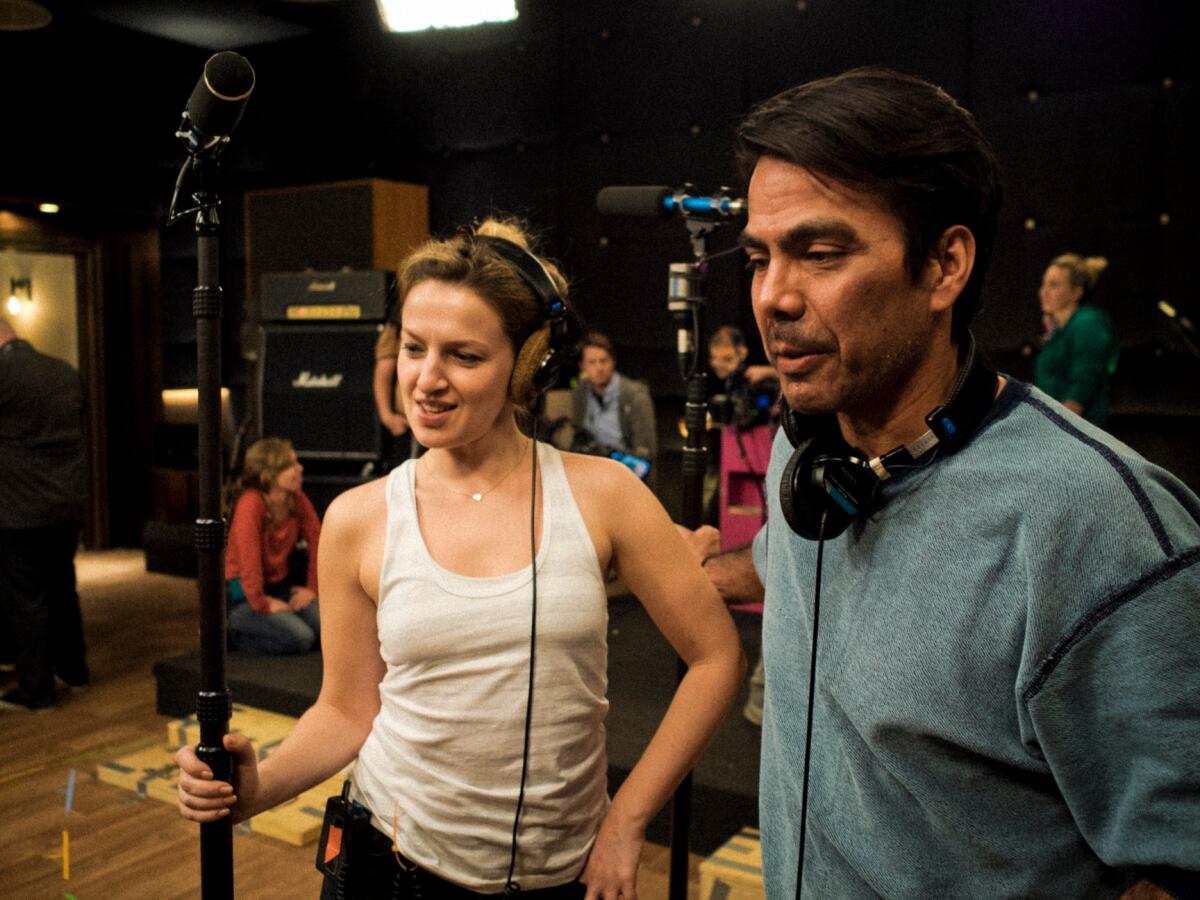
FilmLA, a nonprofit that tracks on-location permitting in the city, released a report in April that revealed a slow bounceback in production after the dual strikes. Local on-location filming in the first quarter of the year was down 8.7% from the first quarter of 2023. Television production was especially impacted, with production falling 16.2% from last year.
Paul Audley, the president of FilmLA, said these findings are startling when considering that film and television production saw a “retraction” at the start of 2023 in anticipation of the looming writers’ strike.
“What we’re facing is a combination of effects of the studios, as well as the streamers, cutting back not only the number of series they produced but in some cases the number of episodes they’re producing for shows,” Audley said.

Subscribers get exclusive access to this story
We’re offering L.A. Times subscribers special access to our best journalism. Thank you for your support.
Explore more Subscriber Exclusive content.
With scarce work opportunities, many crew members are concerned about how they will maintain their health insurance, which is often directly tied to the number of hours they work. Those who have coverage with the Motion Picture Industry Pension and Health Plans must work 400 hours in a six-month period to maintain their insurance. Many veteran crew members, like hairstylist and department head Jason Orion, who’s worked on shows including “Grey’s Anatomy,” said he has never been close to losing his coverage until now.
Film and TV writers of varying experience levels are struggling to find work after the Hollywood strikes amid an ongoing industry contraction.
Orion was able to keep his health insurance thanks to a job on “9-1-1.” He said because he worked down to the wire before the 2007-08 writers’ strike, he thought he’d be busy until the strikes officially began. In reality, he had “an almost nonexistent beginning of 2023.” Even the shows and films shooting in L.A. now have slashed many departments, he added, noting sets that historically employed 20 hairstylists now have just two or three.
Orion said “9-1-1” was a “very hard show,” noting that crew member Rico Priem recently died in a car accident after pulling a 14-hour overnight shift. “We were all tired, it was a very terrible thing,” Orion said after noting that hours on sets are generally “brutal and relentless.”
These tough conditions are one of the top concerns in ongoing negotiations between the International Alliance of Theatrical Stage Employees (IATSE), which advocates for film and TV crew members, and the Alliance of Motion Picture and Television Producers (AMPTP), which represents Hollywood studios. Much like the WGA and SAG-AFTRA negotiations, wage increases, residuals and the use of artificial intelligence also are issues on the table.
The International Alliance of Theatrical Stage Employees (IATSE) is scheduled to enter general contract negotiations with the Hollywood studios this week.
Some crew members said they’re cautiously optimistic that negotiations will proceed smoothly and that work opportunities will ramp up once an agreement is reached, which members seem to believe will happen before their current contract expires on July 31.
For others, optimism does not come easily after a year of struggle. Fink said working in sound for 14 years was “honestly one of the biggest mistakes I’ve ever made in my life,” and that she feels uneasy about the future. One of her primary concerns is the increasing number of productions moving away from L.A. and California to states or countries that offer better tax incentives for production — a phenomenon dubbed runaway production.
“I’m so afraid that there isn’t going to be a job to even be concerned [about] what the conditions are,” Fink said.
California offers $330 million annually in film tax credits, but other states looking to build up their status as production hubs, like New York and Georgia, provide more attractive incentives and programs with higher or unlimited funding. New York’s cap is $700 million and Georgia currently does not have a limit.
New York is doubling down on film and TV to compete with its main rival, L.A., for a bigger slice of the Hollywood pie — even as the industry is struggling to rebound.
“California remains noncompetitive with the rest of the world that is offering incentives and tax credits,” Audley said. “Everybody’s aware that California is not an inexpensive place to do business and we have, in the past, been able to overcome that … but it’s just noncompetitive and we don’t have anywhere near enough money in those funds from the state to draw and keep production in L.A.”
Outside of the U.S., several countries, including the United Kingdom, New Zealand and Australia, are offering cushy tax incentives for studios, where they can bypass unions and pay crews lower wages than in the States.
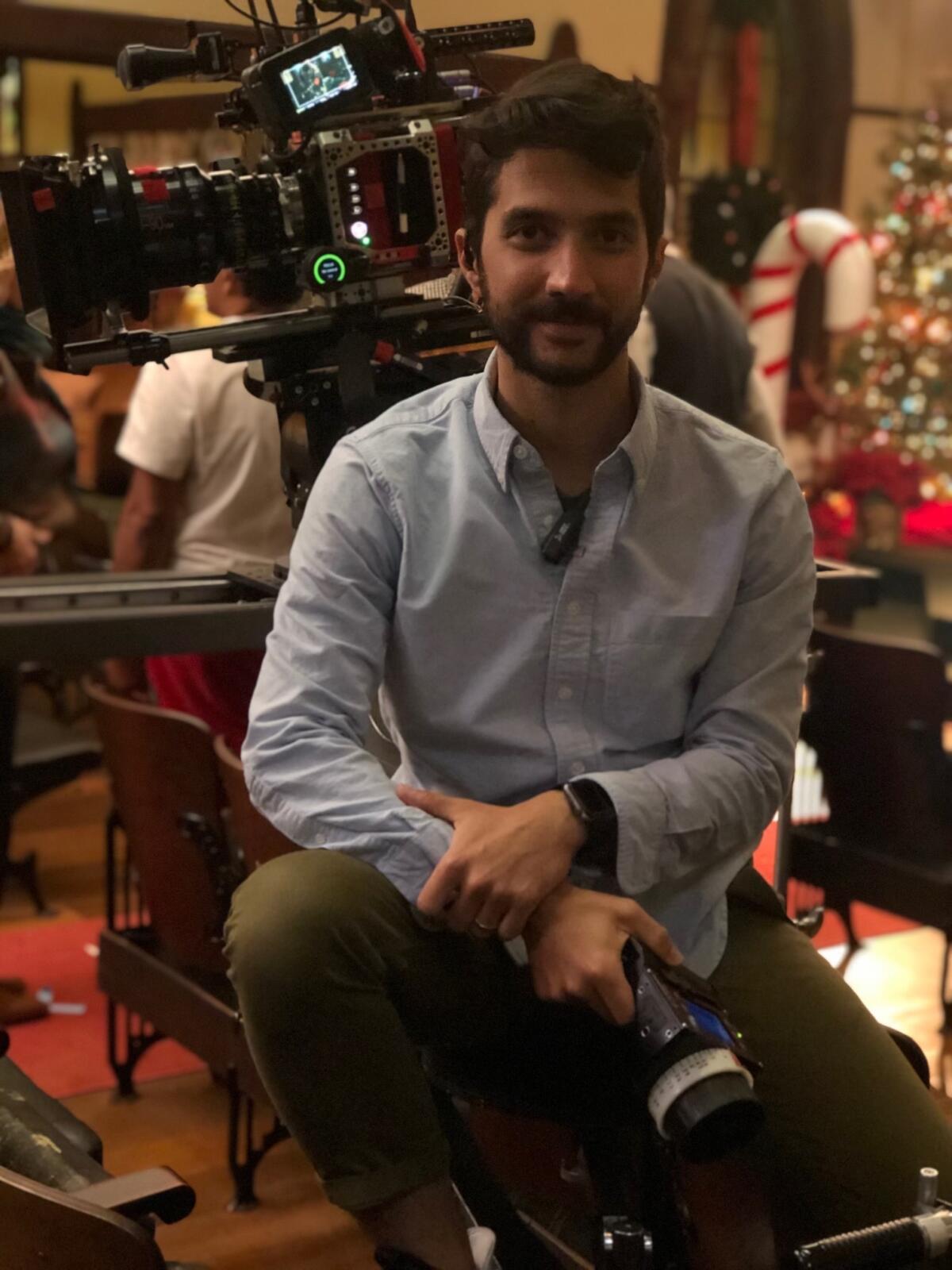
“For so long, American culture was the thing that we exported. It is very strange to watch everyone be OK that it’s getting imported,” said Ian Barbella, a camera assistant who’s worked on series and films including “Lessons in Chemistry” and “Wine Country.” “There’s no context of [how] that’s an American company not using American workers.”
These compounding sources of stress — the fear of their jobs moving out of state or abroad, the strenuous conditions they face on set and the lack of employment opportunities — are affecting the mental health of many crew members.
Studios and workers alike were eager to restart film and TV production after the Hollywood strikes concluded. What’s taking so long in California?
Diego Mariscal, a dolly grip with 25-plus years of experience and credits including “Spider-Man: No Way Home” and “The Mandalorian,” has been running a popular Facebook group called Crew Stories for the last five years. The online community of 90,000 shares on-set experiences — both the good and the bad — and offers support through posts and fundraising for colleagues in need. Mariscal said he has seen the toll this “weird limbo” has had on his peers.
“Everyone’s just in panic mode and they don’t know what to do,” Mariscal said. Through his social media accounts, he said he has recently fielded multiple messages from crew members experiencing suicidal thoughts and severe mental distress.
Communities like Crew Stories and the friendships crew members have developed with co-workers have been a refuge for many. Jennifer Rose Clasen, a still photographer for “The Flight Attendant” and “Big Little Lies,” said her “film family” has been leaning on one another and sharing their mental health struggles as they muscle through the dry spell of work and the uncertainty that lies ahead.
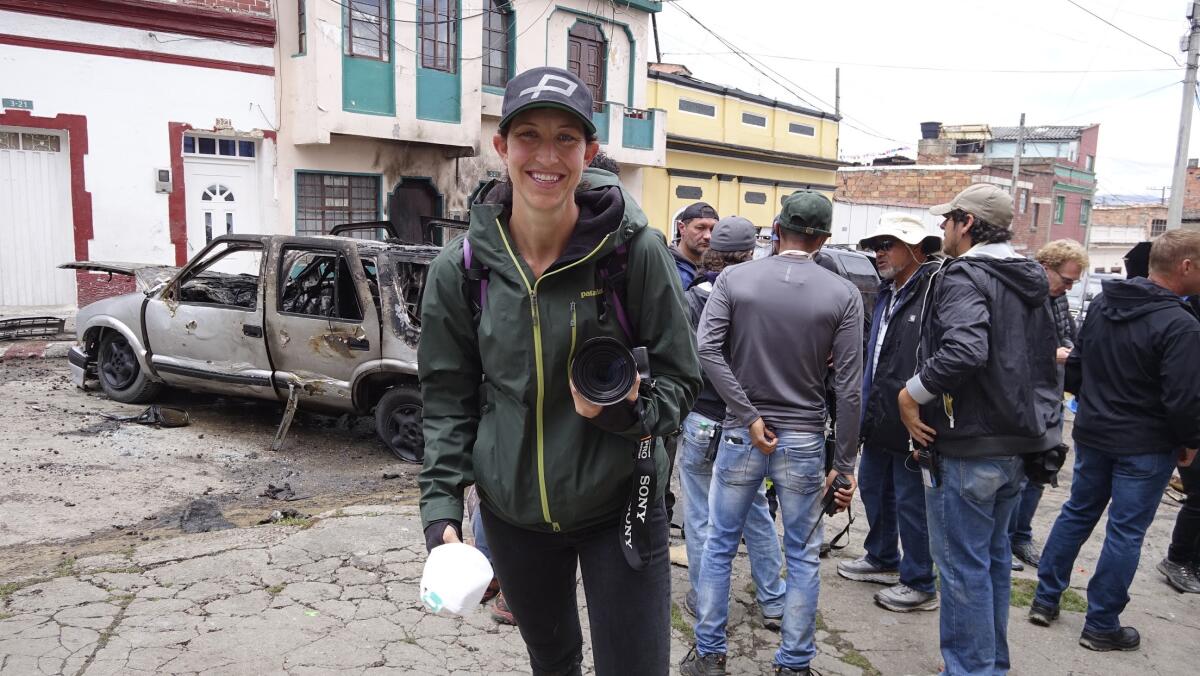
“I constantly have to remind my friends this isn’t their fault because there’s a little trickle of work out there so there’s just enough for people to feel like they’re failing,” Clasen said. “That, compounded over 10, 12, 14 months, truly takes a toll on people’s well-being.”
Amid the mental and financial challenges they’re facing, some said those outside of the industry expect them to seek out adjacent careers. Dunkerley said it’s not that simple.
“I love what I do,” he said. “You definitely question what you do, you wake up [and] it’s kind of like, ‘What am I doing? What am I supposed to do now? What’s going to happen?’ And you just hope that something will pop up. I’m really hopeful. Fingers crossed.”
Sign up for This Evening's Big Stories
Catch up on the day with the 7 biggest L.A. Times stories in your inbox every weekday evening.
You may occasionally receive promotional content from the Los Angeles Times.
More to Read
Sign up for This Evening's Big Stories
Catch up on the day with the 7 biggest L.A. Times stories in your inbox every weekday evening.
You may occasionally receive promotional content from the Los Angeles Times.
